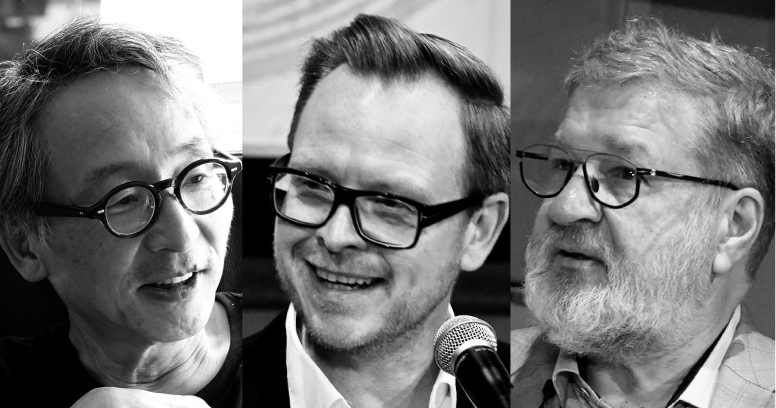【Relay Interview 1】Prof. Yasuo Deguchi of Kyoto University:Chapter 3 “‘You can’t do it alone’ as the Starting Point—Striving to Form an International ‘WE’ through Collaboration”

This is the last part of a series of interviews with Professor Yasuo Deguchi of Kyoto University, who serves as Co-Chairperson of the Kyoto Institute of Philosophy.
Details
Interviewer: You have pointed out that viewing society through a single value framework leads to certain parts being suppressed. Could you give us a concrete example?
Deguchi: Modern education places a lot of emphasis on what you “can” do, especially in the intellectual domain, encouraging students to push one another in developing those abilities. That’s not necessarily bad in itself; however, by focusing on ability to such an extreme degree, we’ve ended up with a hyper-competitive society in which many see “inability” purely as a shortcoming to overcome. In my view, that represses the multilayered identity that is intrinsic to human beings. In the United States, for example, Donald Trump was re-elected as President, and one reason often cited is the divide between the elite and the rest of society. I suspect that a major factor behind this rift is the excessive focus on “what one can do,” which effectively left many people behind.
I’ve proposed what I call a “WE Turn,” which involves recognizing our fundamental inability to do anything alone and returning to the perspective that we’re always part of a “WE.” Recently, I’ve also been using the phrase “inability turn.” If we imagine two layers of value—what we can do and what we can’t—then we should see the importance of not being able to do certain things and acknowledge that as well. I believe this viewpoint needs to be introduced at the compulsory education level in particular.
I recently discussed this topic with Markus Gabriel, our Institute’s Senior Global Advisor. In order to change the values taught in schools, you first have to change the values of society at large, or no one will support you. But how do we change society? Ultimately, it must start with education. This is a classic “chicken-or-egg” dilemma, but we concluded that all we can do is step into the cycle and keep it going.
Interviewer: In practical terms, what specific initiatives are you planning to undertake toward that end?
Deguchi: One is to build an international network. Modern society has become overly single-layered. This is not unique to Japan—it’s a global issue inherent in what we might call “modern society.” That’s why it’s so important for those who share this understanding to collaborate internationally and expand efforts to realize a multilayered society of values. Another important task is to articulate our ideas clearly and accessibly—in multiple languages—to gather like-minded supporters.
After the Institute was established in July 2023, Mr. Sawada and I traveled overseas frequently as part of building this network. Whenever a philosopher and the chairman of NTT show up, side by side to say, “We’ve founded an institute. We’re creating a network for a multilayered society of values—please join us,” people are quite surprised. Of course, there is industry-academia collaboration in Europe and the United States, but the most common reaction from those we talk to is simply, “We’ve never seen a collaboration like this before.”
Interviewer: On the international collaboration front, your advisor, Professor Gabriel, is playing a significant role.
Deguchi: I first met him in February last year. Although our backgrounds are quite different, we immediately realized how similar and complementary our ways of thinking are. It almost felt odd that we hadn’t met sooner, given how closely our vectors align. He’s declared his full commitment to the Kyoto Institute of Philosophy, and indeed offers support in many forms. Thanks to his involvement, our international network-building efforts have gained even more momentum, which is a tremendous help.
Interviewer: The Institute is planning to hold its First Kyoto Conference on September 23 and 24 this year. What kind of conference will it be?
Deguchi: We’d like it to serve primarily as a launch pad for building a network of people who share our outlook. From that network, we envision joint research and collaborative projects taking shape. We plan to sow the seeds ahead of the conference so that various initiatives will continue to grow afterward. We intend to hold the Kyoto Conference on a regular basis, though the focus will evolve over time. One theme that will undoubtedly remain central is AI. Generative AI is transforming society at a profound level, and its future trajectory remains unclear. This represents a significant huge issue.
Another major keyword is “polarization.” We saw this prominently in the U.S. presidential election, and it’s become visible in Europe as well. How do we prevent society from fragmenting like this? We need to formulate numerous solutions, express them in concrete language, and ultimately reflect them in legal frameworks, regulations, and technological advancements. Meanwhile, as we face the threats of AI and polarization, there is also the question of how media—newspapers, television, and so on—will maintain quality. That’s a huge topic as well.
In other words, we want not just industry and academia, but also government agencies (both national and local), engineers and other experts, NGOs, NPOs, and those from the fields of education and religion to participate in the Kyoto Conference. Our goal is to create a setting where the “government, industry, academia, and civil society” can think collaboratively about the future.
Others



